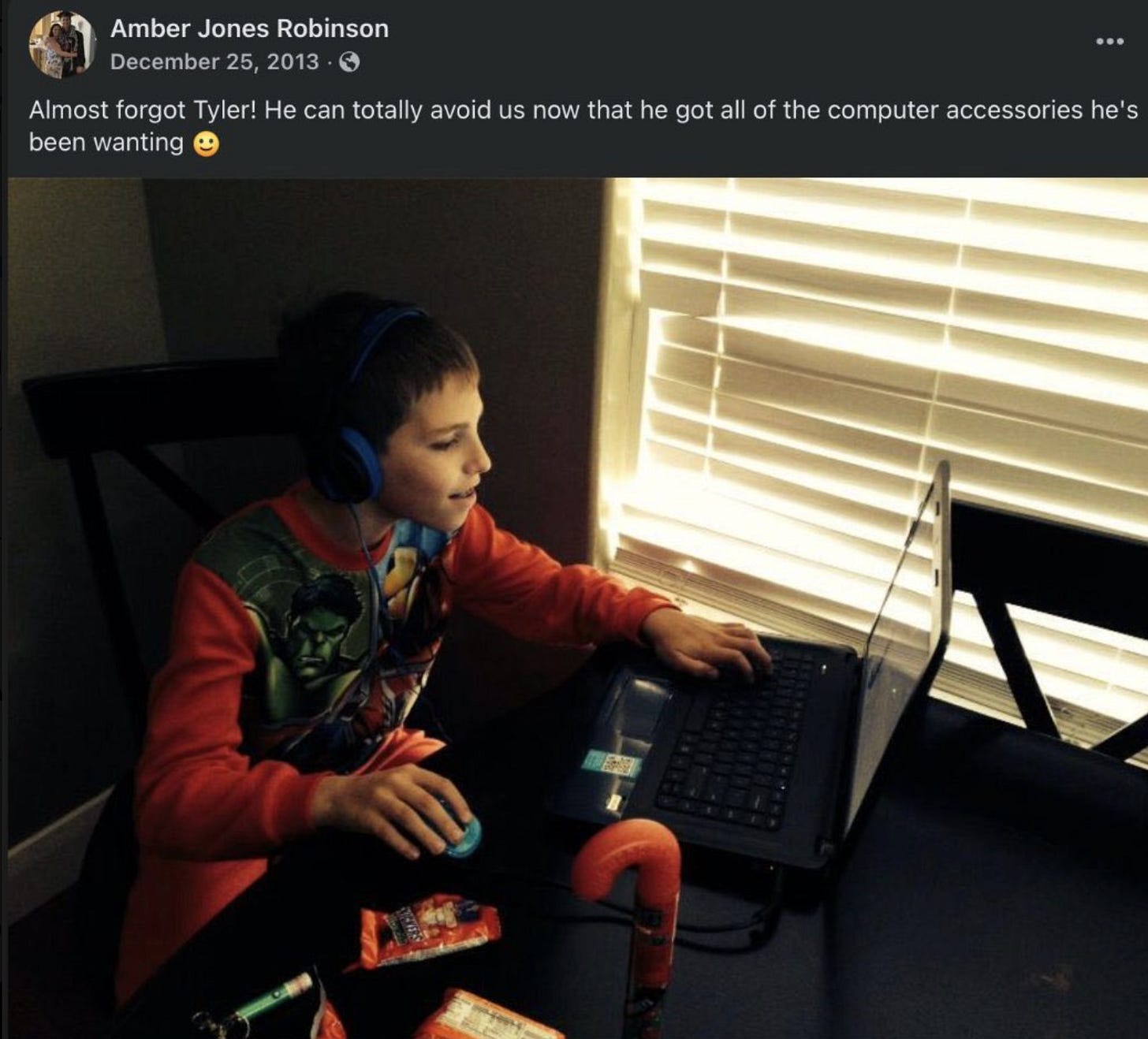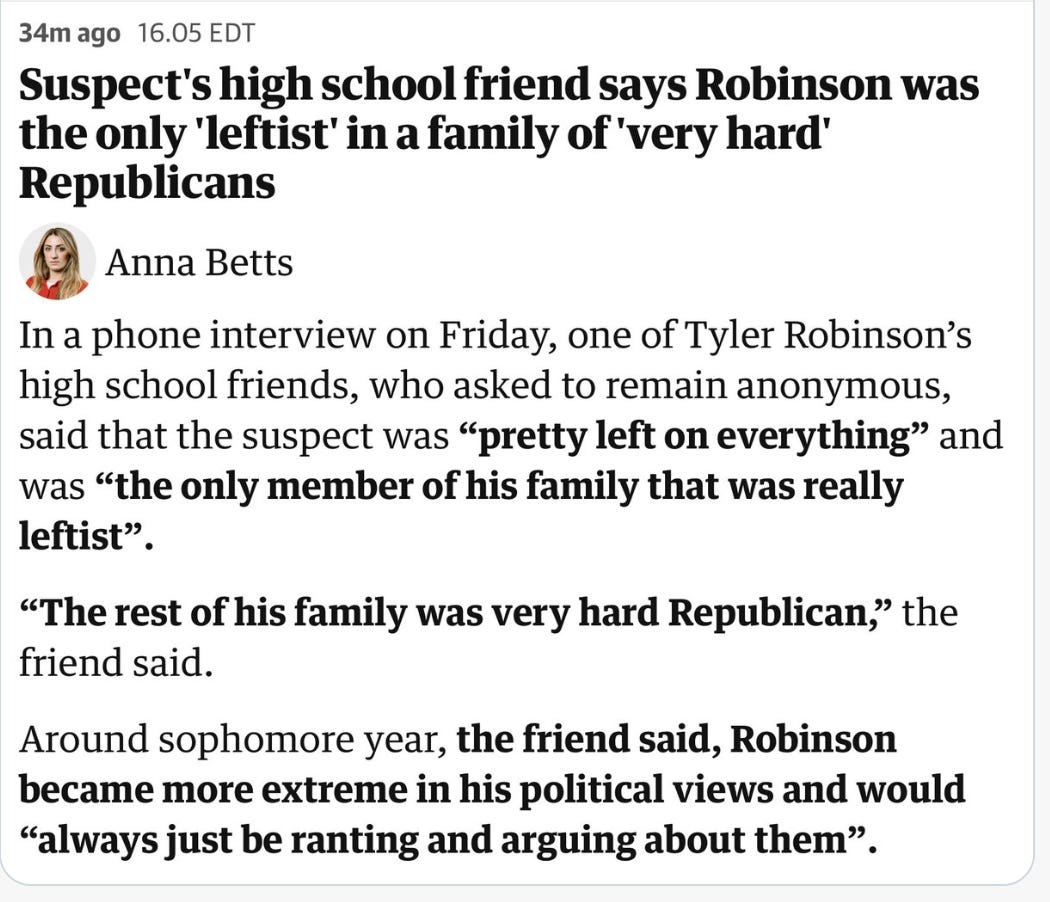Unplugged From Reality
How The Forces that Radicalized Tyler Robinson May Be Closer to Home Than You Think
The radicalization of Tyler Robinson, the young man from an apparently untroubled household who murdered Charlie Kirk, has spawned debate on everything from gun violence to the role of Antifa in stoking our national divisions. But when all is said and done, the primary take-away from Tyler Robinson’s radicalization may be the danger of unrestricted internet access. From Rod Dreher earlier today:
I think Noam Blum has a point:
I know what he means. Look at this image Tyler Robinson’s mother posted 12 years ago:
Look, I’m not really blaming her. She and her husband did what so many millions of parents did, and do every day. We ought to have known, but we didn’t know, not back then. Everybody told you that getting your kid a computer and getting him online was giving him an advantage in the world.
Now we know. We know. What are we going to do about it?
The problem is not really that he held left-wing views. The problem is they became ever more extreme, and he would “always just be ranting and arguing about them.”
In the days to come, I guess, we will find out more about how Tyler Robinson was radicalized. A lot of people online are jumping to the conclusion that college radicalized him. I doubt that very much. He dropped out after a short time — this, though he had excellent grades in high school, and earned a big scholarship — and was at the time of his murder going to trade school. My guess is that he was radicalized entirely online. The bullets police found with his discarded rifle had pro-trans and Antifa messaging scrawled on them, and dialect associated with the online gaming community.
He apparently thought online was real life. There are tens of millions of people just like him. Very many of them are on the Right too. I’ve told y’all about the rise of right-wing extremists among young white males, something I’ve been hearing about from conservative Christian college professors, high school teachers, and personal friends who are seeing it happen to their own sons. I’m not talking about young men who become more conservative, and more politically engaged. That’s fine! I’m talking about young men who give themselves over to race hatred and Jew hatred. According to every single one of my sources, these demons are entering into them through deep exposure to online haters.
A young man who says he went to high school with Robinson describes him as a “Reddit kid” — as a teenager who spent all his time online. It broke him.
I think Rod puts his finger on something important. It isn’t just that spending inordinate time online can radicalize a person, so that someone gets pulled to the extreme left or the extreme right. That happens, to be sure, but the deeper problem is that children who spend time online lose touch with reality itself, so that they begin approaching real life with the categories appropriate for gaming. One of the first signs of losing touch with reality is that we stop seeing other people as people but as enemies. It’s why Jew hatred is on the rise among people who have never actually had a Jewish friend; it’s why race-based hatred is being stirred up by people who have never bothered to interact with the peoples they deplore, all the time imagining they understand members of these groups because of the information coming from carefully curated media diets.
Losing touch with reality in the online rabbit hole means that we are apt to misinterpret the relative importance of what is being reported in the news cycle (whether mainstream or alternative); ergo, because the majority of the discourse is about politics, it is easy to assume that politics is more important than it actually is in driving social change (see my post, “Politics isn’t As Important As You Think”). Conversely, we may under-estimate the importance of what is happening in our immediate environment, including (oh the irony) how our own households may be radicalized or pornified once we allow unsupervised internet into the home.
From my book, Are We All Cyborgs Now?: Reclaiming Our Humanity from the Machine:
We were designed to process information in our immediate surroundings, specifically communities of around 150 people or less. The further this radius is extended, the greater becomes the human propensity for misjudgment, and thus the need for highly honed epistemic virtues. Thus, a person who is required to think about the bigger world picture (the king, as described in Proverbs) must have a special set of virtues; and consequently the Hebrew Wisdom Literature gives considerable attention to the epistemic virtues necessary for the wise ruler.
I go on to explain that the problem today is that we consume information about what is happening on the national and international level yet without the epistemic virtue of the wise king. By all accounts this is what happened to Tyler Robinson, and it turned him into a violent monster. But what is crucial to understand is that while violence is the terminus of a journey in epistemic vice that the internet sends us down, we may still be catechized in a disordered approach to information even if we don’t ride the train that far. And that happens regardless of whether we are left-wing or right-wing. This is because the internet is a breeding ground for epistemic vices, including traits like mental rigidity, caricaturing, oversimplifying, hurried thinking, the Dunning-Kruger effect, the epistemological bubble effect, the echo chamber effect, anchoring bias, misrepresentation, inattention to detail, hyper-autonomy, presumption, etc. These traits are in contrast to the epistemic virtues, which include character traits like fair-mindedness, metacognition, inquisitiveness, even-handedness, intellectual humility, tolerance for ambiguity, cognitive empathy, non-dismissive consideration of arguments, slowness when analyzing information, charitable interpretation of opposing arguments, carefulness, intellectual honesty, thoroughness, being able to weigh up different points of view including listening to opposing points of view with cognitive elasticity, etc.
How do we know whether an information diet is forming us in the epistemic virtues or the vices? In my video on this subject, I challenge everyone to ask the following questions of every online source you consume:
Does this news channel, website, program, pundit, or podcaster, help me to be more reflective, more contemplative, and more thoughtful?
Does this source help me to better understand why many intelligent people might disagree about this controversial issues?
Is this particular source merely supporting the groupthink of one particular echo chamber?
Is this source merely offering the comfort of reinforcing what I already believe?
Does my information diet help me better summarize the counter-arguments of those who disagree with me, so that someone holding a contrary view could listen to my summary and say, “Yes, that’s fair.”
Does this source help cultivate epistemic virtues or vices?
All of this should be a charge to parent readers: don’t let the internet turn your household into an ecosystem of epistemic vice!
Ironically, conservative parents who would never think to pay for their son or daughter to sit under Neo-Marxist professors nevertheless let their teenagers have access to Reddit and YouTube, which is a radicalization chamber infinitely more effective than the classroom because it occurs in the isolation of psychic autonomy. Of course, it doesn’t start there: no parent wakes up one day and says, “I want my child to consume a toxic diet of polarizing ideology on Reddit, while also consuming enough violent porn videos to become inoculated to brutality.” A twelve year-old with a Mac in his bedroom may initially be only interested in gaming; but gaming is so powerful an addiction that this is where weary parents usually give up the battle. After years of fighting over Minecraft and Fortnite, the parents typically back off for the sake of peace, so that by the time their teenager discovers Reddit and Pornhub, the parents have already rendered themselves impotent.
A twelve year-old with a Mac in his bedroom may initially be only interested in gaming; but gaming is so powerful an addiction that this is where weary parents usually give up the battle. After years of fighting over Minecraft and Fortnite, the parents typically back off for the sake of peace, so that by the time their teenager discovers Reddit and Pornhub, the parents have already rendered themselves impotent.
Toolkit of Digital Boundaries for Healthy Living
Aubrey is a senior in high school and has had an iPhone ever since she was thirteen. At first Aubrey hardly used her phone. Over the years, however, she began using it c…
MAGA Goes Woke
I want to open by sharing two incidents that may not, at first, seem related. The first is the fatal air collision earlier this year. Prior to an investigation into causes, President Trump announced that the disaster, in which an Army helicopter collided with a commercial jet killing 67 people, had likely been caused by DEI hiring policies. This reflect…







MK Ultra with fast Internet speed.